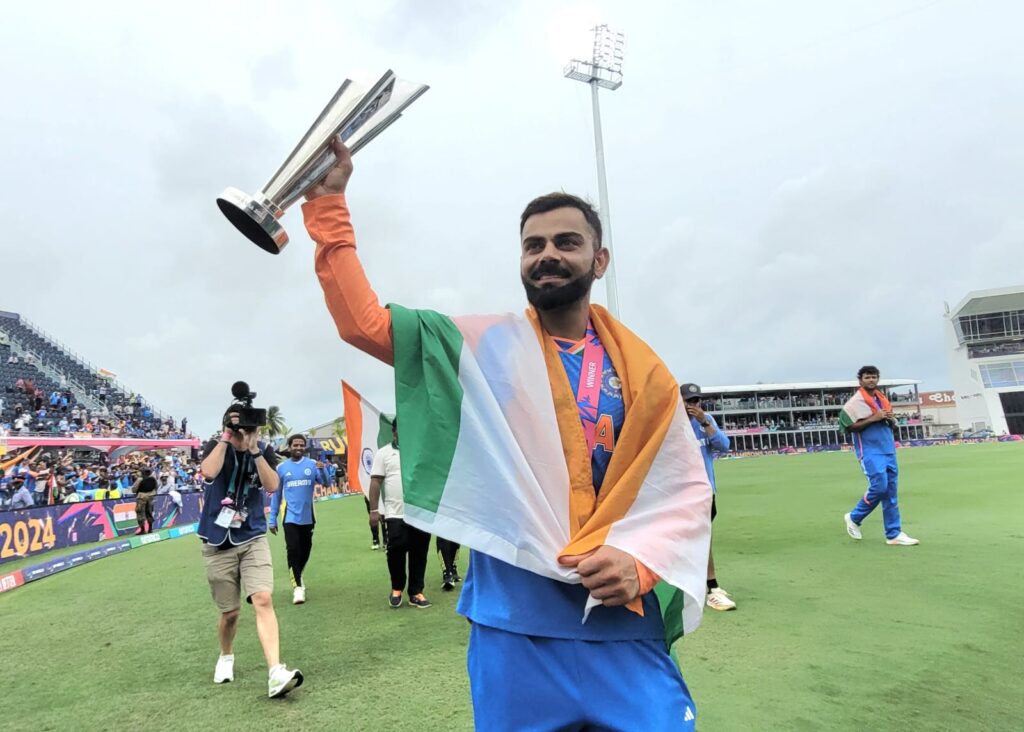
It was a freeze frame that said more than a thousand words ever could. As a teary-eyed Virat Kohli embraced Rahul Dravid and buried his face on the coach’s shoulder, you could glimpse Yashasvi Jaiswal looking on in the background. Jaiswal, touted as Indian cricket’s future just a few months ago, didn’t play a game in this tournament. Yet, he wasn’t glowering or sulking. Instead, he was beaming as he looked at the picture in front of him. It was the expression of a young man soaking in the moment, fully aware that his time would come.
This is the greatest gift that Dravid, Kohli and Rohit Sharma, the captain, have left Indian cricket. Just as the transition from Sachin Tendulkar, Dravid and VVS Laxman, to Kohli, Cheteshwar Pujara and Ajinkya Rahane – Rohit would become a Test regular only later – went far smoother than anyone expected, so Indian cricket can expect to forge ahead with barely a speed bump on the way.
Two decades ago, at the end of India’s barrier-breaking tour of Pakistan in 2004, the late Shaharyar Khan, then president of the Pakistan Cricket Board (PCB) spoke enviously to a small group of Indian journalists about the ‘incredible role models that you’re blessed to have’. That Tendulkar-Dravid-Sourav Ganguly generation passed the torch on to the likes of Kohli and Rohit, and it’s to their eternal credit that they kept the flame burning bright for Jaiswal and company to carry forward.
Whatever you might think of Rohit’s sometimes-coarse language on the field, or Kohli’s over-the-top celebrations, the fact is they have been fantastic mentors for a new generation. Kohli’s work ethic is second to none, while there is so much for a young player to learn from both Rohit’s composure as captain and the empathy with which he treats his teammates. If you can’t learn from them, and the likes of R Ashwin and Jasprit Bumrah, it’s time to pull up stumps and go home.
Kohli’s knock in the final will be spoken about for years to come, if nothing else for reminding us how cricket will always be a team game. A decade ago, he played a near-identical innings, 77 from 58 balls, in the World T20 final against Sri Lanka. That evening, no one else contributed anything of substance, and India’s total of 130 was easily overhauled. This time, his 76 from 59 balls was buttressed by serious knocks from Axar Patel, Shivam Dube and Hardik Pandya. Had India lost, the trolls would doubtless have had a field day talking about ‘selfish’ Kohli and ‘reckless’ Rohit. That almost everyone in the XI contributed something meant such a fate was avoided.
As for Kohli, what can you say about that strength of will? Coming into the final with 75 runs from seven innings, he must have known he wouldn’t have kept his place in the XI but for his awesome reputation. But then, this is what great players do. Sir Vivian Richards, who always says Kohli reminds him most of himself, is fond of saying that the legends are those able to bend occasions to their will.

Kohli has done it so many times it’s unreal. While Gautam Gambhir and MS Dhoni deservedly got the plaudits for their 90s in the 2011 World Cup final, it was Kohli’s 35 and 83-run stand with Gambhir that stabilised the innings after Lasith Malinga had slung out both Virender Sehwag and Tendulkar. Without his 43 – India were 66-5 at one stage – the team wouldn’t even have had a total to defend in the 2013 Champions Trophy final.
As in the 2014 World T20 final, his magnificent 89* (47 balls) in the 2016 semi-final went in vain because those around him weren’t up to the task, and he finished the 2023 World Cup with a century in the semi-final and 54 in the final. He will forever rue the fact that he couldn’t kick on after the period of consolidation in Ahmedabad, as he was able to in Barbados.
Sadly, India’s cricket culture has become so toxic that we can no longer accept that our heroes are also mortals who are allowed to fail. They are either Gods or demons, depending on the results, and nothing in between. In that sense, Kohli’s words after the final should be carved in stone for impulsive fans to remember. “One day, you feel you can’t get a run, then things happen,” he said, relief write large on his face.
What he omitted to mention was that things invariably happen for those that put in thousands and thousands of hard yards. For both Kohli and Rohit – who had lifted this trophy as a 20-year-old at the beginning of his journey – this was just reward for all those years of peaks and troughs, triumphs and heartbreaks. The expression on Jaiswal’s face suggested that he understood that.



